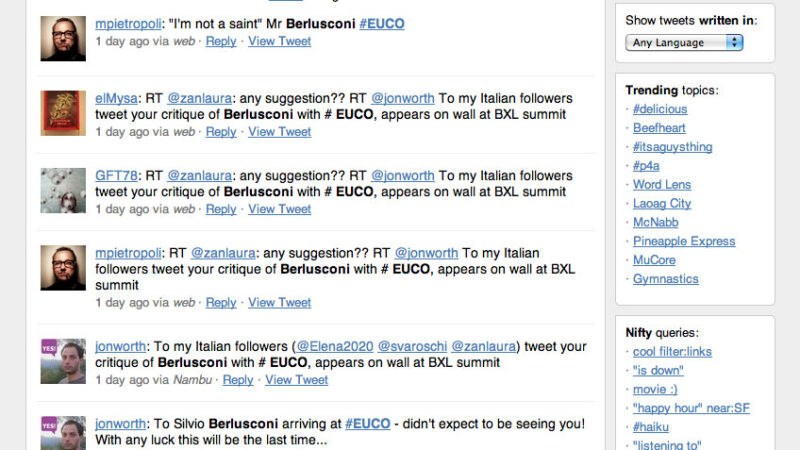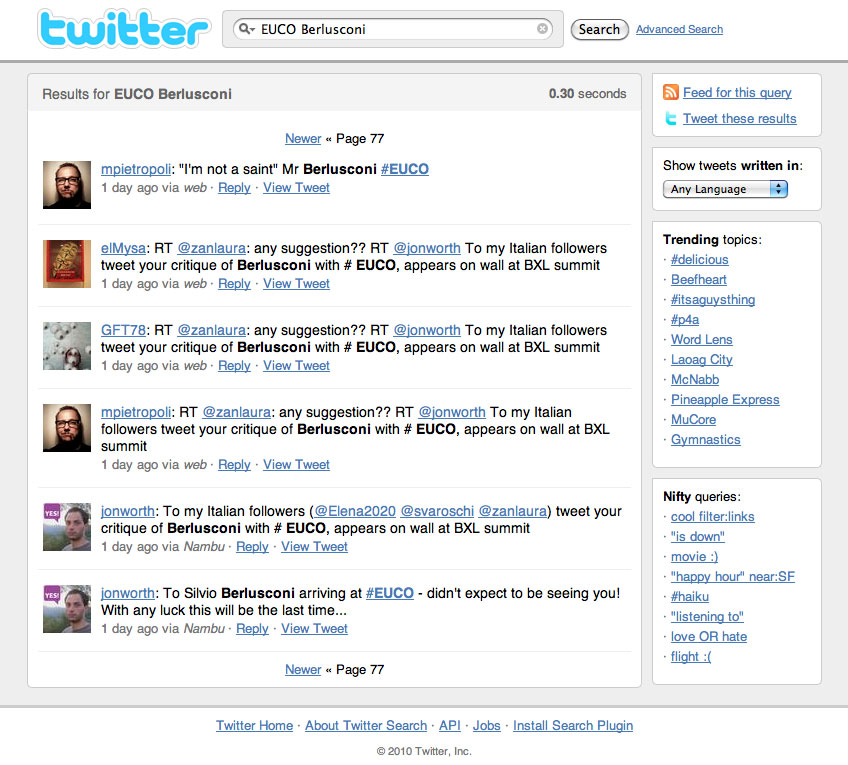A roundup of the #EUCO – Berlusconi Twitterwall story

The screenshot above shows the oldest results from search.twitter.com for “EUCO Berlusconi”, and explains how the Twitterwall story started (I’ve previously posted about here and here). Just to set the record straight this is exactly what happened.
First, I realised that tweets containing #EUCO would appear on the Twitter wall, and – among other critical tweets – wrote this, the first tweet shown above mentioning Berlusconi.
Second, a few minutes later I followed up with this tweet to @zanlaura, @Elena2010 and @svaroschi, Italian political people I follow. The tweet was re-tweeted by @zanlaura, and then further re-tweeted by @mpietropoli, the Twitter user credited by The Guardian as the tweeter who caused the Twitterwall to be turned off.
The way the press and media cottoned on to this story is interesting too. The first article about the incident, beyond the blogosphere, was this piece on EUObserver by Leigh Philipps. Leigh knew about the incident in part because of this tweet from me, and retweeted the link to one of my previous posts on this, but how the story started is not featured. It’s not the first time that Leigh has profited from something I dug up and then my name is nowhere to be seen.
Once EUObserver started it, Paul Waugh lifted Leigh’s story (without any credit) and put it on Politics Home. I previously had respect for Paul, a journalist who uses Twitter to converse with readers and to source stories, but my tweet to him has gone without answer, and inaccuracies remain in his story as I write. Not impressed, and a bit ironic when covering a story that’s about a lack of honest debate at a European Council.
Leigh then wrote a piece for The Guardian and posts have appeared on TechCrunch, BBC News, Bruno Waterfield’s Telegraph blog, Gawker, New York Times (quoting @Eurogoblin), and EU Weekly. The only posts that actually explain the start of the story correctly are Washington Post, Lettera43 (in Italian) and Eurogoblin on his blog. Mathew also has a good analytical post worth reading.
So there you have it, the story of how two Twitterwalls became a story reported worldwide, and probably drawing attention of people to the European Council that would otherwise never have heard of it. I’m happy to have started the whole thing and just have a mild annoyance that the vast majority of the credit has gone to others. But as a little blogger wanting to cause some mischief I suppose that’s to be expected.
[UPDATE]
Paul Waugh has contacted me, stating the piece will be updated to credit where appropriate, but at 1156 GMT Saturday this still hasn’t happened.

I am sorry for having missed your first tweet, but I was speaking in a meeting at that time (kudos to @zanlaura for having paid attention).
I promise to be more attentive and reactive in 2011!
By the way, my account is @Elena2020 (link is fine) 😉
I do see any ones that arrive with my name. But I didn’t see any this time. What was the message? I saw one from Jon asking if I’d had a photo of the tweet-wall, but that was after I’d gone to speak to the Council official.
Anyway. really, honestly, truly, I didn’t see whatever tweet you’re referring to. But this is getting a little school-yard tantrum-esque. I know I stick to journalistic ethics. So whatevs.
I’m sure that’s the case for practically everyone – it’s the equivalent of someone shouting your name across a crowded room. How can you not turn your head?
I just went and checked out the tweet … yep, it’s difficult to imagine Leigh missing it, with his name in it and everything.
General tweets, yes. But I *always* read tweets that cite me (i.e. @jonworth) – is that not the case for other Twitter users?
Good roundup. It’s always good to remember that one’s tweets are very easy to miss. They’re just so ephemeral.
Thanks, Mr Goblin.
Unlike some in the world of journalism, I have a great deal of respect for (the best) of blogdom – I absolutely back the idea that bloggers (of a certain standard) should be able to win EU institutional accreditation. And Twitter is an amazing tool for journalists. Indeed, it seems almost made for journalists. I have had a number of stories that originated on Twitter, including one of my all-time best read, the story about the EU Fundamental Rights Agency recasting the Charter of Fundamental Rights as an 80-minute-long epic poem. In that case, I DM’d the author of the original tweet and asked if he minded if I followed up on his tweet and investigated.
Working for the EUobserver, a somewhat specialist publication, I am quite used to my stories being nicked without sourcing. (In one case, a Romanian daily newspaper had simply translated a story and stuck the new ‘author”s byline on it. I only found out when my Romanian colleague brought it to my attention) So I do try not to do it myself.
To be fair to Leigh, he has shown he’s very happy to quote bloggers in his stories. He did originally credit you in the Citzalia story, but it was taken out by the sub-editor. The #EUCO story happened very fast, and it’s really not easy to make corrections (especially corrections that would be viewed as “minor” by most editors) once it’s gone out.
I’m sorry if I missed you, but I honestly did not see your tweet, Jon. The first I saw of it was a tweet from Erik Wesselius. And then a series of mentions by a number of different tweeters.
No problem 🙂